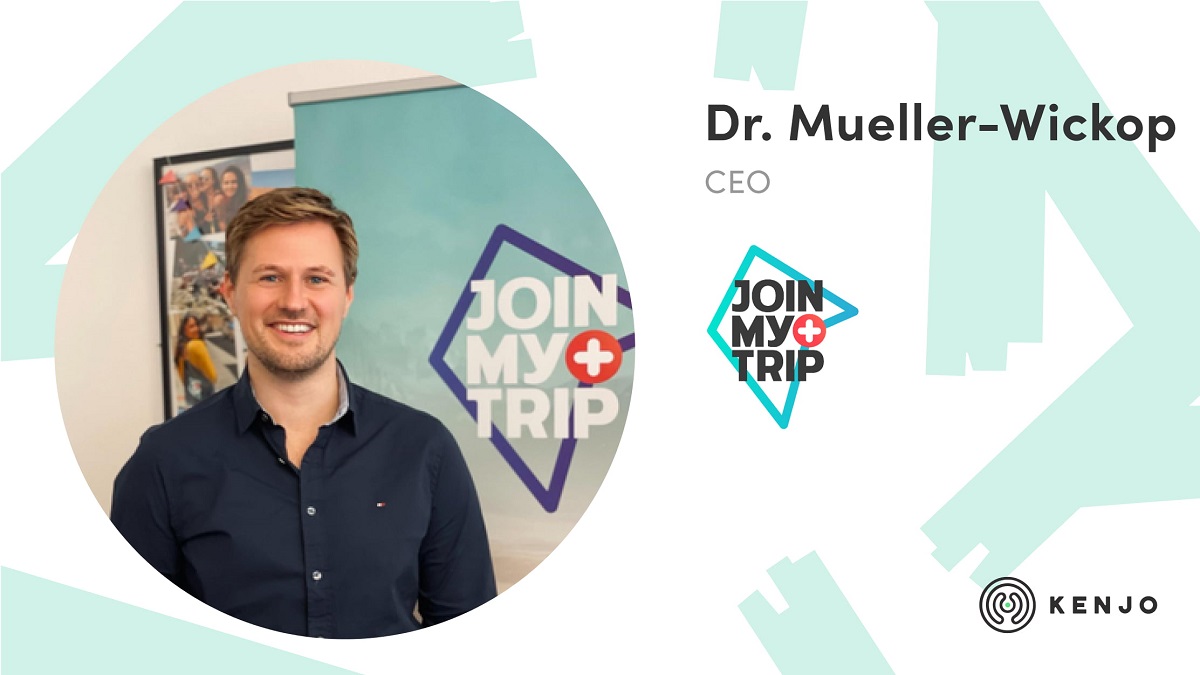Nowadays, so-called CoWorking Spaces are proving to be a hit with many employees: they have become an important element of employer branding during job interviews, especially since more and more companies are switching to permanent remote workplaces due to the coronavirus pandemic. With the introduction of hybrid working models, companies are integrating flexible workplace solutions into their strategies to meet the demands of mobile employees in different cities and countries. This is exactly what we stand for at Kenjo!
We talked to Dr Niels Mueller-Wickop, CEO of the travel platform JoinMyTrip, about remote work packages for employees, where they travel together somewhere for a period and work together as a company from that location. This is all about company culture and feel-good benefits, which can make all the difference to employee engagement.
What is CoWorking, and why did you decide to implement this type of collaboration into your workplace culture?
CoWorking is the logical evolution of remote working. While many companies still have to come to terms with the fact that they can no longer permanently look over their employees' shoulders, we have simply taken it one step further. Why should our colleagues sit (alone) at home in grey Germany, when they could be working more productively and for them more cheaply somewhere by the sea in the south?
In other words, CoWorking simply means moving the home office to accommodation with other working people. Ideally, of course, to a place that offers many advantages such as beautiful weather, blue sea, nature on your doorstep and cheap living costs - what more could employees want?.
What does a CoWorking experience or a trip at JoinMyTrip look like?
One person, we call them the TripLeader, creates a CoWorking trip. Usually, the TripLeader simply selects suitable accommodation with fast internet, pool, a good view etc. and is the contact person for all necessary reservations or preparations.
Afterwards, he or she shares the trip with their colleagues, or they can publish it on our platform and choose suitable co-workers. In addition, the TripLeader can earn money by organising the trip, which of course may require some effort depending on the size of the group.
What advantages have you seen in joint CoWorking trips?
Personally, I am surprised every time by how motivating these CoWorking trips are. Contrary to the belief of many HR managers, I also regularly notice an enormous increase in productivity among my colleagues.
As well as improved key performance indicators, I also think there is no better way for employees to acquire intercultural skills than by simply being on site.
What advantages do CoWorking Spaces have for your remote employees?
CoWorking spaces have many advantages. Just to name a few: fast internet, séparées for longer calls, contact with the local community and much more. Since some of our colleagues would otherwise work at their desks in their living rooms, co-working spaces are also a good way to bring the office feeling back into their lives.
How do you track the productivity of your employees when they work remotely?
The same way as in the office - through results. We understood early on that time tracking is counterproductive in most cases. We firmly believe that results are what counts, not some weird KPI like screen time or what the time clock says.
How does Remote CoWorking increase productivity?
What we have noticed time and again in our team is that increased productivity can be attributed to two main factors:
- Increased motivation (self-explanatory)
- and increased creativity.
We explain the second factor as follows, without making any scientific claims: both the new environment and the new co-workers give each individual a new perspective on what and how they work.
Some of our colleagues particularly rave about "skill sharing lessons": they and their CoWorkers sit down together for an evening and everyone shows what he or she is particularly good at. This starts with Google Analytics, goes on to video editing and texting, and ends with yoga sessions.
In the office, at home and in hotels, what trends do you see for mobility in the workplace?
After one and a half years of COVID, I am firmly convinced that if you want to keep a hold of the top talent, you have to offer maximum flexibility. Every company is in global competition for talent, and unfortunately many companies have still not understood this.
Accordingly, it is only logical to also make the place of work more flexible. Those who, after the last year and a half, are still using conventional arguments, such as working time supervision or corporate culture, will certainly have a very, very hard time in the long run. It is not the employers who decide where and how work will be done in the future, but the top talent!
Of course, the design should be individual from company to company. For example, we allow a maximum 2-hour time zone difference and employees have to arrive at their new place of work at least three days before their first working day. This way, we make sure that everyone has time to acclimatise.
Do you have any tips on which co-working spaces are the best in the world?
Honestly, it’s very dependent on the person or the group. Some like it very luxurious and standardised, while others would prefer a more uniquely designed space.
For me personally, it also depends on the country and the season: a little more relaxed in the summer and in the south, warm and cosy in the winter.
Thank you, Niels, for this inspiring interview about working remotely in co-working spaces.
Looking for more inspiration on remote work? Then take a look at the following articles:
About Dr. Niels Mueller-Wickop
Niels has now travelled to almost 100 countries and turned his hobby into his profession. After working for several years as a consultant at PwC and as an executive assistant at the Munich Re Group, a year-long trip around the world gave him the idea for JoinMyTrip. The company connects travellers and facilitates not only classic trips but also co-working trips.


